MySQL addressbook type in Ozeki NG SMS Gateway
This page demonstrates the MySQL addressbook type available in Ozeki NG SMS Gateway. Please read this description page and follow the screen shots to learn the various types and their functions.
In this example I login as user admin to Ozeki NG SMS Gateway. To be able to configure the addressbook, click on the respective user (Figure 1).
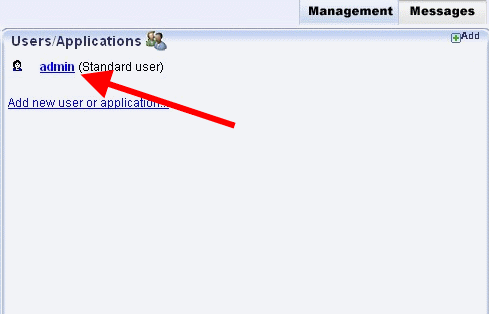
Click on Configure and select Advanced tab on the configuration pane (Figure 2).
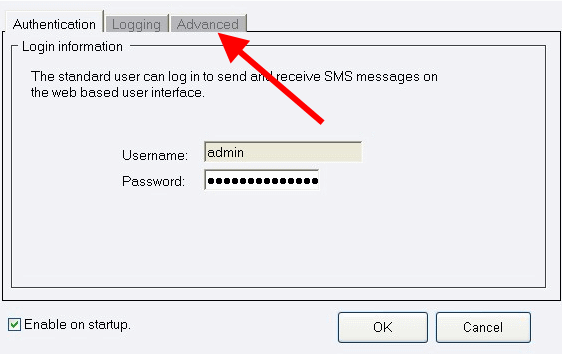
In the section called Addressbook, specify the Type of Addressbook.
SQL Addressbook
You can select SQL Addressbook type on Advanced tab (Figure 3). In this case contacts will be stored and uploaded from an SQL database.
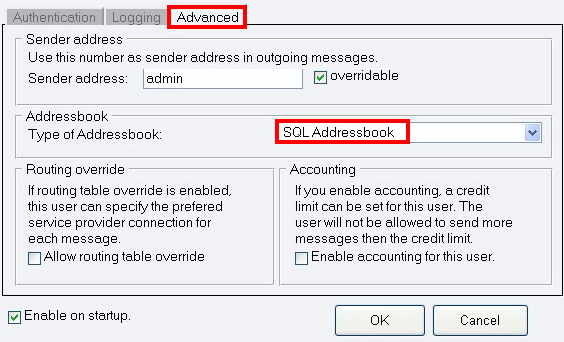
To configure the addressbook, click on Configure and on Addressbook configuration. On Connection information tab you can specify the Connection string with which the system connects to the database (Figure 4).
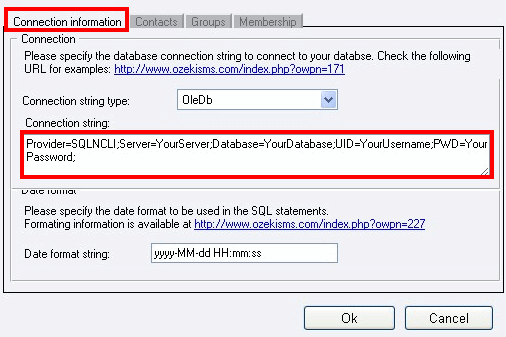
MySQL also requires Odbc as Connection string type, which can also be selected on Connection information tab (Figure 5).
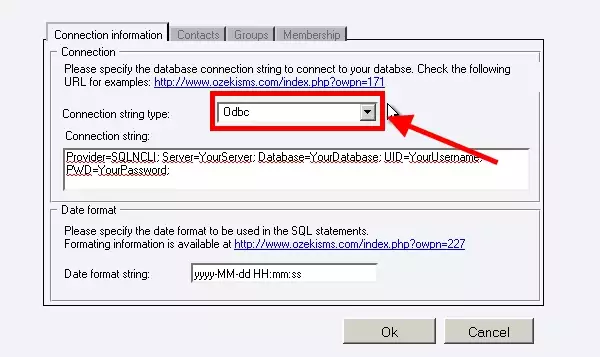
First you need to create database tables:
MySQL
You can connect to MySQL with this connection string:
Driver={MySQL ODBC 5.1 Driver};Server=IPaddress;Database=DBname;User=UserName;Password=PassWord;Option=4;
|
CREATE TABLE `contact` (
`id` INT NOT NULL AUTO_INCREMENT PRIMARY KEY ,
`name` VARCHAR( 50 ) NOT NULL ,
`mobile` VARCHAR( 255 ) NOT NULL ,
`telephone` VARCHAR( 255 ) NOT NULL ,
`fax` VARCHAR( 255 ) NOT NULL ,
`email` VARCHAR( 255 ) NOT NULL ,
`im` VARCHAR( 255 ) NOT NULL ,
`other` VARCHAR( 255 ) NOT NULL ,
`comment` VARCHAR( 255 ) NOT NULL ,
`createTime` DATE NOT NULL
);
CREATE TABLE `contactGroup` (
`id` INT NOT NULL AUTO_INCREMENT PRIMARY KEY ,
`name` VARCHAR( 50 ) NOT NULL ,
`useraccount` VARCHAR( 50 ) NOT NULL ,
`subscribekeyword` VARCHAR( 50 ) NOT NULL ,
`greetingmessage` VARCHAR( 50 ) NOT NULL ,
`unsubscribekeyword` VARCHAR( 50 ) NOT NULL ,
`byemessage` VARCHAR( 50 ) NOT NULL ,
`allowsubscription` VARCHAR( 5 ) NOT NULL
);
CREATE TABLE `membership` (
`groupId` INT NOT NULL ,
`contactId` INT NOT NULL
);
|
On Contacts tab you can specify the SQL statements of the contacts: for Load, Create, Delete, and Update fields (Figure 6).
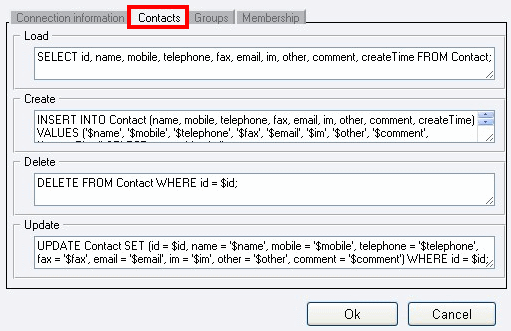
Replace all statements
in Contacts tab to the follows:
SELECT `id`,`name`,`mobile`,`telephone`,`fax`,`email`,`im`,`other`,`comm`,`createTime` FROM `contact`; |
INSERT INTO `contact`(`name`,`mobile`,`telephone`,`fax`,`email`,`im`,`other`,`comm`,`createTime`)VALUES
('$name','$mobile','$telephone','$fax','$email','$im','$other','$comment','$createTime');SELECT LAST_INSERT_ID( );
|
DELETE FROM `contact` WHERE `id`='$id'; |
UPDATE `contact` SET `id` = '$id',`name`='$name',`mobile`='$mobile',`telephone`='$telephone',`fax`='$fax', `email`='$email',`im`='$im',`other`='$other',`comm`='$comment' WHERE `id` = '$id'; |
On Groups tab you can define the SQL statements of groups for Load, Create, Delete, and Update fields (Figure 7).
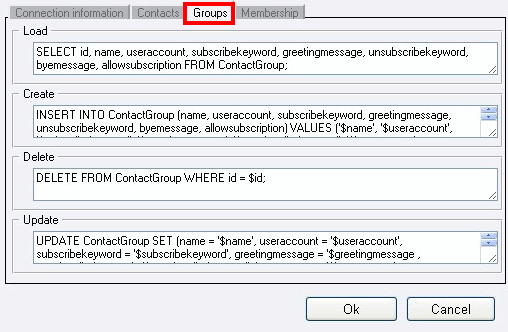
Replace all statements
in Groups tab to the follows:
SELECT `id`,`name`,`useraccount`,`subscribekeyword`,`greetingmessage`,`unsubscribekeyword`, `byemessage`,`allowsubscription` FROM `contactgroup`; |
INSERT INTO `contactgroup`(`name`,`useraccount`,`subscribekeyword`,`greetingmessage`,
`unsubscribekeyword`,`byemessage`,`allowsubscription`) VALUES ('$name', '$useraccount',
'$subscribekeyword', '$greetingmessage', '$unsubscribekeyword', '$byemessage',
'$allowsubscription');SELECT LAST_INSERT_ID();
|
DELETE FROM `contactgroup` WHERE id = '$id'; |
UPDATE `contactgroup` SET `name`='$name',`useraccount`='$useraccount', `subscribekeyword`='$subscribekeyword',`greetingmessage`='$greetingmessage', `unsubscribekeyword` ='$unsubscribekeyword', `byemessage` = '$byemessage', `allowsubscription` = '$allowsubscription' WHERE `id` = '$id'; |
SQL statements can also be specified for members on Membership tab: Load, Add to group, and Remove from group (Figure 8).
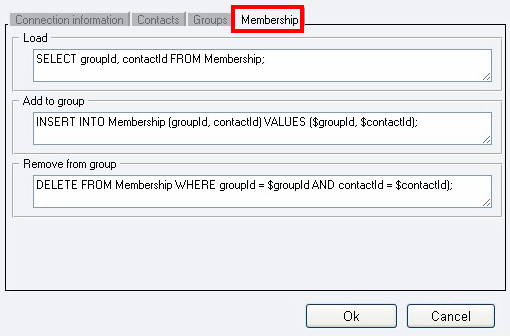
Replace all statements
in Membership tab to the follows:
SELECT `groupId`,`contactId` FROM `membership`; |
INSERT INTO `membership`(`groupId`,`contactId`) VALUES ('$groupId','$contactId');
|
DELETE FROM `membership` WHERE (`groupId` = '$groupId' AND `contactId` = '$contactId'); |
